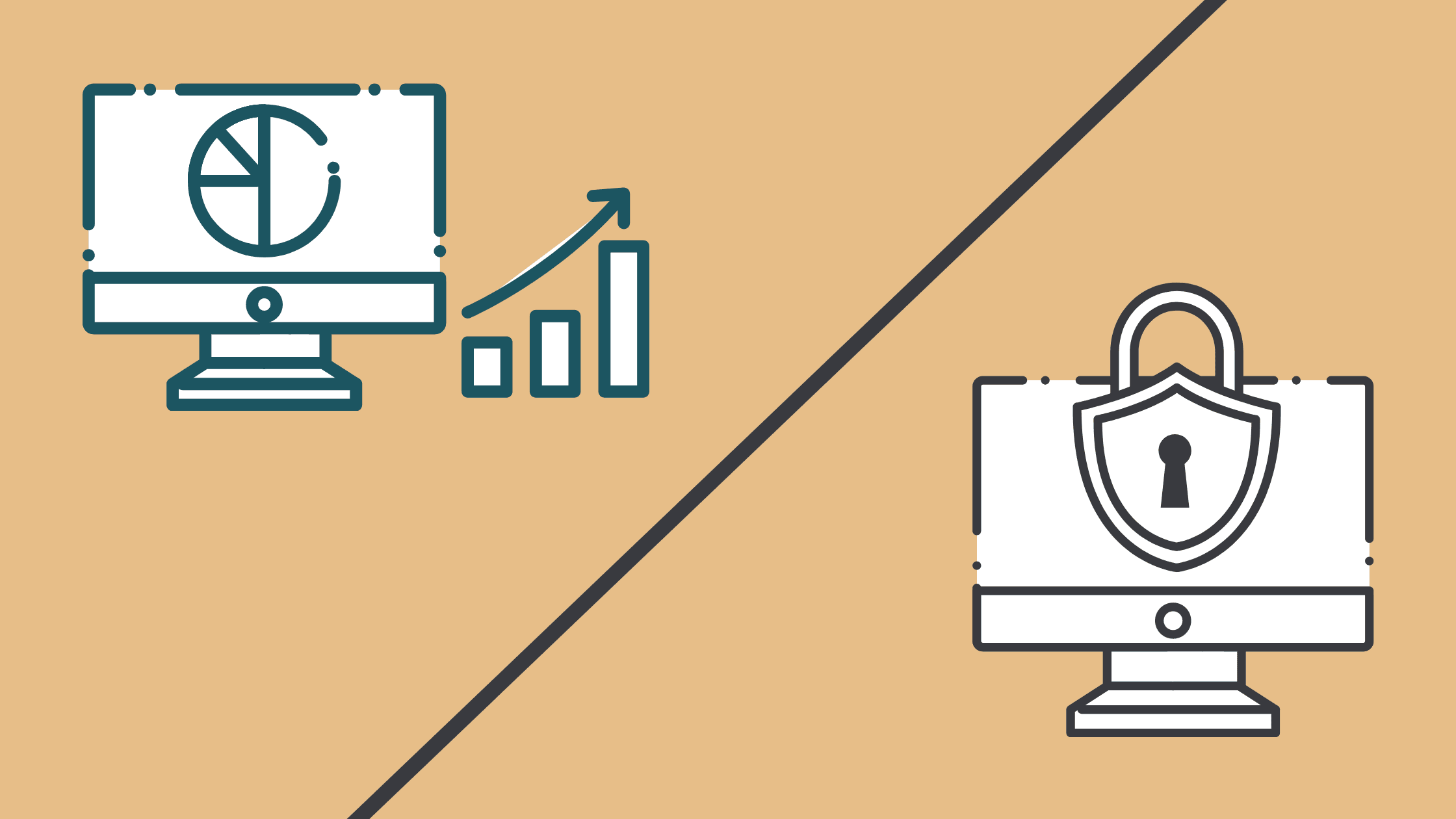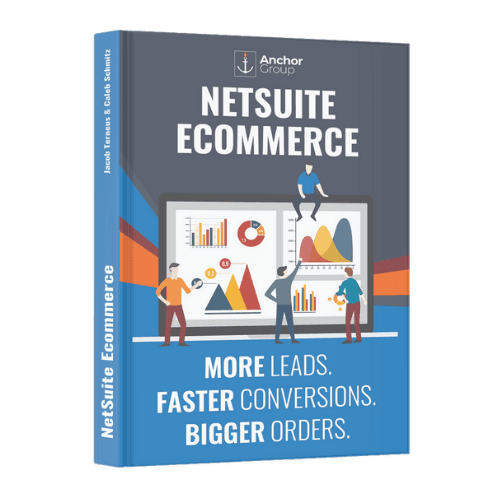What sets these NetSuite ecommerce solutions apart, and why might you pick one over the other as your company's ecommerce platform?
What is SuiteCommerce?
SuiteCommerce requires and comes pre-integrated into the NetSuite ERP platform, which means you have direct access to your ERP data and don’t have to pay for an integration. With SuiteCommerce, your company's ecommerce management is also directly connected to your other NetSuite tools, such as order and inventory management and CRM, for a streamlined business management experience. Due to its seamless nature, this solution is a unified platform that easily supports B2C (business to customer) and B2B (business to business) operations. The best part is that enterprise-level solution implementations can be completed in under 30 days by an experienced SuiteCommerce partner.
Two NetSuite ecommerce platform options are SuiteCommerce (previously known as SuiteCommerce Standard) and SuiteCommerce Advanced (SCA). Though nearly identical, there are a few key differences between these two solutions that you will want to consider before purchasing one or the other.
Similarities
Before discussing the differences between the two platforms, let's examine what SuiteCommerce and SuiteCommerce Advanced have in common.
- Business Analytics: Business insight and analytics tools such as configurable dashboards allow you to create reports and gain insight into your business, while integrations provided to Google Analytics and Google Tag Manager expand the scope of this business insight.
- Customer Account: This functionality enables your team to offer personalized service to customers through various available capabilities (view purchase history, locations, drop-ship options, wholesale distribution data, customer-specific data, personalized catalogs, view payment balances, and pay invoices online).
- Performance: Content delivery network (CDN) caching and single-page architecture (loading all the JavaScript at once) create a smooth shopping experience through improved performance and speed that fosters engagement.
- Purchasing, Payments, and Shipping: Provide your customers with a variety of options for purchasing (customized pricing, terms and credit limits, channel or volume discounts), payment methods (credit cards, promo codes, gift cards, invoicing), and shipping (seamless integration with carriers for printing shipping labels and automatic tracking information).
- SEO and Marketing: SEO Friendly Automation (customizable H1, title, meta tags, SEO-friendly URL links) and additional SEO customization help you rank higher on Google, while marketing tools (upsells, cross-sells, related products, social media sharing, and product reviews) help you reach your customers and drive your online sales.
- Website Management: Easily edit site content through responsive design themes with drag-and-drop tools and extensions for configuring new features and functionalities across multiple scheduled site versions.
- Storefront: Responsive themes with pixel-perfect design capabilities optimize your site for any device, while faceted navigation and elastic site search make it easy for shoppers to find, learn about, and buy your products.
Primary Difference: Access to Source Code
Now that we've covered the primary shared features of SuiteCommerce and SuiteCommerce Advanced let's examine the main distinction between the two platforms: access to source code.
SuiteCommerce
SuiteCommerce does not allow access to the source code, so heavy customization that changes the platform's architecture is impossible. However, you can still write extensions that create nearly all the customizations you require.
Note: Some SuiteCommerce Apps are exclusive to SuiteCommerce Advanced because they manipulate the source code. You will want to consult a NetSuite developer to learn if the additional features that you plan to add through apps will require SCA. The developer may know of alternative apps/customizations to solve the same pain point that are compatible with SuiteCommerce.
SuiteCommerce Advanced
With SuiteCommerce Advanced, developers have complete access to the source code, opening the door to almost any customization you could imagine. Depending on your business, this may be important. For example, if innovation is your competitive advantage and you are positioning your webstore to do things that haven’t been done before or are not commonly done, SCA is the way to go.
Related Article: Shared Open Graph on SuiteCommerce
What are some examples of a source code change that requires SCA?
- A company wants every order through the ecommerce platform to be entered as a Purchase Order rather than a Sales Order. This would require a change to the source code.
- A company wants to allow customers to log in to "My Account" and modify existing orders that they have placed themselves. This would require a change to the source code.
What are some examples of customizations that do not require SCA?
- You want to change the SuiteCommerce theme. Let's say you don't like your theme and have a graphic designer make a new mockup to match. This mockup has a different layout and new colors. This is not a change to the source code. It is HTML and CSS work that you can access with SuiteCommerce Standard.
- You want to create an extension that adds a new line item to the cart when an add-on (i.e., engraving option) is selected. This requires JavaScript but does not require source code changes.
What if I don't know whether a customization requires source code changes?
The easiest way to identify which solution you need is to contact a SuiteCommerce developer who builds customizations in SuiteCommerce and SuiteCommerce Advanced daily. They will know if source code is likely required. If you have a road map of features you will want for the ecommerce platform, explaining them to the developer is a good idea to ensure you pick the correct solution.
Secondary Difference: Upgrades
SuiteCommerce updates automatically, while SuiteCommerce Advanced has a "version lock". On the surface, automatic upgrades sound much easier to manage, but version locks are helpful for companies that require more customizations within their ecommerce platform.

SuiteCommerce
With SuiteCommerce, your site is easy to maintain because there is no “version lock” and no need to migrate between versions. Just be aware of your customizations before each update, as there are risks of customizations breaking during automatic updates.
- Pro: Immediately take advantage of new features and updates that are automatically available with every release.
- Con: There is a higher risk of customizations breaking during automatic upgrades.
You will typically have access to new SuiteCommerce updates in sandbox before the release date, allowing you to protect customizations proactively. Developers can use extensibility API (managed NetSuite functions) to ensure that a customization will break less frequently, as NetSuite has committed to ensuring that those functions will be compatible with all future updates.
SuiteCommerce Advanced
SuiteCommerce Advanced is not a managed bundle, meaning you must migrate to the latest versions. However, there are benefits to having a bundle that is not managed. Companies rely on having a platform that doesn't break whenever a managed upgrade occurs. Having a bundle that is not managed means that you can make the transition when your team has had the time to test out the upgrade in sandbox.
- Pro: It allows you to ensure that all your customizations still work properly with the new upgrade.
- Con: It lacks the ease of automatic upgrades.
Whenever you want to upgrade, you should contact your development team to manage the SCA version migration by auditing the theme and extensions, testing the new version in sandbox, making any updates to a customization, and deploying to production when fully tested.
Scalability
While both SuiteCommerce and SuiteCommerce Advanced are scalable solutions within themselves, there is even more room for growth since you can scale from SuiteCommerce to SuiteCommerce Advanced.

You can upgrade to SuiteCommerceAdvanced later if you only need SuiteCommerce for now. Switching from SuiteCommerce to SuiteCommerce Advanced is relatively simple since it uses much of the same source code, extensions, themes, and other NetSuite ERP customizations. You don't need a new implementation to switch; it only takes a day to fetch and deploy the code to SuiteCommerce Advanced. However, the process will likely involve migrating from one SuiteCommerce version to another, so some work will still be involved. The best part about finishing the transition to SuiteCommerce Advanced is that the solution is so powerful you'll never need to transition to another platform again!
If you have more detailed questions regarding the scalability of SuiteCommerce or SuiteCommerce Advanced, you should contact a SuiteCommerce Consultant who can help you discover how this would work for your company.
Implementation
SuiteCommerce is a NetSuite module that can be downloaded as a bundle and installed into your NetSuite environment. Implementing it requires a special skill set because it depends on advanced knowledge of NetSuite architecture and web development in single-page applications. That's why you should find a NetSuite developer specializing in SuiteCommerce implementation.
Implementing or migrating to any new platform will require a certain level of effort and time, which needs to be considered when looking into any ecommerce solution. The time required for a SuiteCommerce implementation varies greatly and depends on what type of SuiteCommerce product you purchase. These are general averages for each of these solutions, assuming that you want more than activation and, therefore, customize the platform to fit your business.
- SuiteCommerce: 80 - 200 hours
- SuiteCommerce Advanced: 150 - 500 hours
These ranges vary greatly because different organizations have different requirements regarding the look, feel, and functionality of the SuiteCommerce products. To get an estimate of the time your implementation will take, you will want to speak with a NetSuite Consultant or developer.
Conclusion
Managing all your data in one place makes everyone's lives easier, so companies frequently choose SuiteCommerce and SuiteCommerce Advanced over other platforms. Having images, files, and data live in NetSuite gives companies the tools to achieve operational efficiency that outperforms competitors.
While SuiteCommerce and SuiteCommerce Advanced share the same basic features, there are two key differences to remember. First, SuiteCommerce Advanced gives developers access to source code for greater customization. Second, SuiteCommerce updates automatically, while SuiteCommerce Advanced includes version locking that protects customizations from breaking. When deciding which option is best for you, building out your requirements for the ecommerce website and anticipating your growth needs is important.
If you want SuiteCommerce Standard to save more on your monthly licensing, chat with a SuiteCommerce developer to help identify any customizations you need and any reasons you may want SuiteCommerce Advanced in the future. Spending a little time and money identifying where SuiteCommerce Standard may be the better fit will help you cut overall costs and position yourself for the seamless upgrade to SuiteCommerce Advanced when ready.
NetSuite Commerce Partner
That's all for now, but we hope this article was helpful and informative! If you have general questions about SuiteCommerce implementation or specific questions about gathering requirements and preparing for your own SuiteCommerce Implementation, feel free to contact our team anytime. Anchor Group is a certified Oracle NetSuite Commerce Partner equipped to handle all SuiteCommerce projects, large or small!

We are a premium SuiteCommerce agency that creates powerful customer portals. Unlike our competitors, we have already solved your problems.
FREE SuiteCommerce Book
Want to learn more about SuiteCommerce and how it can benefit your business? We'd like to give you a FREE NetSuite Ecommerce paperback book! Here at Anchor Group, we pride ourselves on having the heart of a teacher. This is just one of the many ways that we follow through on that value. So, what are you waiting for?
Order the free SuiteCommerce book today, and we'll even pay for shipping!

Tagged with Solutions
